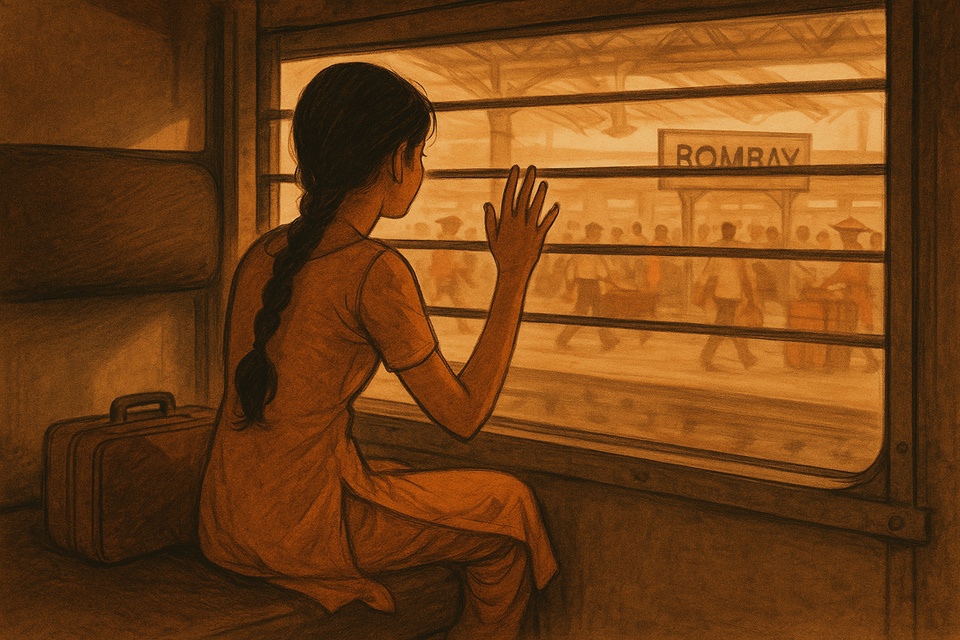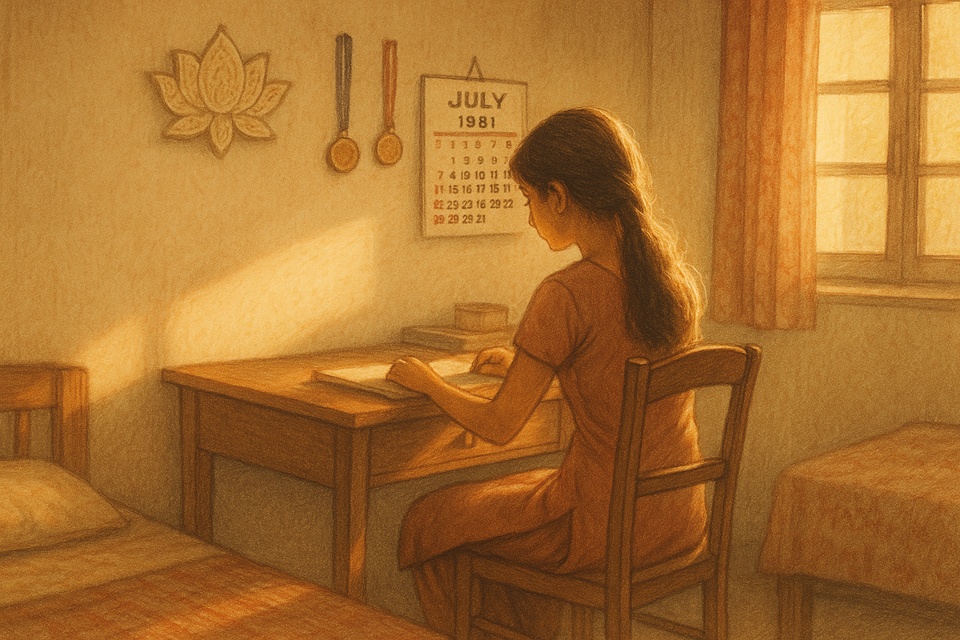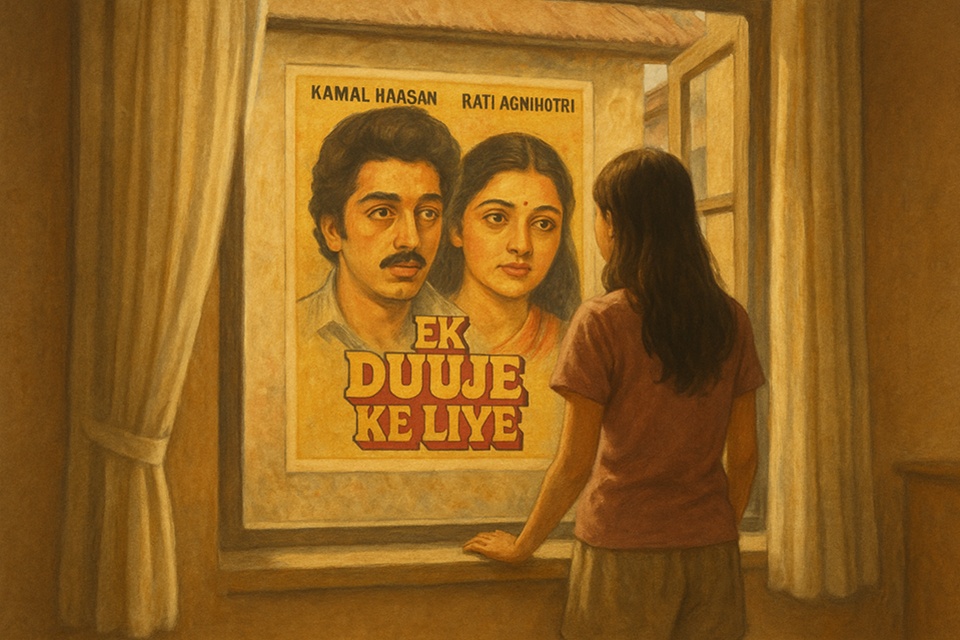It was the summer holidays of 1981. I had just finished class 9 and was about to step into 10th. Our home was a small flat in Bombay, perched above streets that never slept, a place where every sound and sight felt alive. Bombay wasn’t just my city, it was my whole world. I loved the laughter of friends spilling onto the streets, the pav wala’s bell every morning, the smell of the sea mixed with the dust of crowded roads, the chaos of buses and rickshaws, and the endless chatter of people. Every sound, every sight felt like it belonged to me.
My father, Amit Shrivastav, worked at the State Bank of India. He was a quiet man, not strict but deeply rooted in his routine. He found comfort in work and duty. For him, the world outside the bank often blurred, as if life began and ended with files, ledgers, and customers. Yet beneath his calm surface, he carried a gentleness that showed in small ways, bringing home samosas without warning, or humming kishore kumar songs on evenings when he returned early.
My mother, on the other hand, was the heart of our home. A housewife by role but so much more in spirit, she was multitalented. Her cooking could brighten any day, and she had a gift for poetry that often slipped into her conversations. When the day’s chores were done, she would sit by the window with her knitting. Her hands moved steadily as she shaped soft wool into sweaters and shawls. The rhythmic click of her needles was as much a part of our evenings as my father’s quiet humming.
One evening, as we sat at the dining table in our small Bombay flat, my father opened a white envelope. Inside it lay his transfer order. Just one line was enough to change everything. Bombay to Mysore.
My heart sank. My mother’s face went pale too. We had both been born and brought up in Bombay. We knew its streets, its moods, its secrets. And suddenly, it felt as if someone was tearing away the roots that held us to the only home we had ever known. We had just a few days to leave, and in that short time, I had to say goodbye to a city that had given me everything.
Those days became the most precious of my life. My father, who usually followed routine like clockwork, gave me freedom without question. Perhaps he knew what I was about to lose. I wandered through the streets as if I could capture them forever in my memory. I ate pani puri from my favorite stall, sat on Marine Drive watching the waves crash, stayed over at friends’ houses, laughed till midnight, and cried quietly when no one was watching. Every lane, every face, every smell seemed sharper, like Bombay itself was whispering, “Remember me.”
But finally, the day I dreaded arrived. Our belongings were packed into suitcases, but it was our hearts that felt the heaviest. Friends and neighbours came to help us carry the luggage to the station. Their eyes were wet, just like ours. Someone pressed a packet of homemade theplas into my mother’s hands. Another hugged me tightly, as if not letting go would change everything.
We climbed into the train and sat on our berth in silence. The station was alive with noise, vendors shouting, coolies rushing, whistles blowing, but for me, everything felt muffled, as though I was already inside another world.

When the train finally pulled out, Bombay clung to me like the sticky summer air. I pressed my hand against the iron window bars, desperate to hold on to the platform as it slid away. People shouted, waved, carried on with their lives, unbothered by my departure. But for me, time stood still. I wasn’t just leaving a city, I was leaving behind my childhood, my friends, my laughter, my streets, my world.
In that moment, it felt like a whole chapter of my life had been shut forever.
It was the longest journey of my life, and the day I wished had never existed. The train wheels kept moving, but inside me, everything felt stuck and heavy. I wanted time to turn back, to wake up and find myself once again in my Bombay lanes. But no, hours later, we arrived in Mysore.
Mysore was different. Wide roads lined with gulmohar trees, evenings filled with the fragrance of jasmine, and a quiet I had never known in Bombay. The palace stood just a few minutes from our home, glowing at dusk, while the markets were small and time seemed to move slowly. It was beautiful, yes, but when you are sixteen and missing home, beauty can feel cruel. Settling down wasn’t too hard, yet still, Bombay was Bombay. How could anyone ever forget their roots?
The first few days were difficult. I missed my friends from Bombay terribly. My mother, though, was quick to adjust. She had already made friends with our neighbours. That is how I met Amritha, a girl from next door who was in 9th standard. She spoke Kannada but also knew Hindi. Slowly, we became friends too. Over time, she helped me feel less like an outsider.
I joined St. Joseph’s High School as the only new student in the class of ’81. Inside, I felt lost. I had no one to share my thoughts with. Yes, Amritha was there, but in school there was no one I could truly talk to. Still, I had no choice. Life moved on. In those days, my only loyal companions were my books.
My father was not a tough man. He adapted easily to any place and its atmosphere. Working at the State Bank was his world, and his work meant everything to him. Yet every now and then, he surprised us with small gestures that broke his routine.
One ordinary evening, my father came home early. He loosened his tie, washed his face, and said, “Chalo, movie dekhne chalte hain.”
I asked quickly, “Bachchan ka movie?”
He laughed. “Nahin, naya ladka. Kamal Haasan. Naam hai Ek Duuje Ke Liye.”
The name itself made me laugh. Kamal Haasan, it sounded odd, almost funny. I remembered seeing a movie poster on our neighbour’s wall, but I had never really heard of him before. To me, he didn’t look special at all, just another actor.
I was not so much into movies. In Bombay, I had watched Sholay and Mr. Natwarlal with my family. Amitabh Bachchan was fun to watch, larger than life, but movies came and went for me. Heroes were just faces on posters.
Still, we left for the evening show. My mother and I rushed through chores, not wanting to delay him. The theatre was crowded, even in the second week of the film. For a moment, I worried we wouldn’t get tickets. But my father came back with three stubs of paper. I held mine carefully, as if it was more than just a ticket.
Inside, the lights went off, fans hummed above, and the screen lit up. I had gone in laughing at the hero’s name, expecting nothing. But scene by scene, Kamal Haasan pulled me in. His smile, his voice, his eyes, they felt real, like he was living the role, not acting.
And then came Tere Mere Beech Mein. The song didn’t just play. It stayed. It moved into my chest and refused to leave. Even after the movie ended, even when we walked out into the bright Mysore evening, the song kept echoing inside me.
Something had changed. Bachchan, my old action hero, quietly stepped aside. There was no fight. It was just over. From that day, there was only Kamal.
At home, I never had posters on my wall. Our family didn’t allow such things. The walls carried only my mother’s knitted art. But in my own way, I built a small shrine. A little knitted lotus hung near my desk, delicate yet strong, a secret symbol of what he meant to me. In the back pages of my notebooks, I filled the margins with his name, Kamal, Kamal, Kamal.
“Tere Mere Beech Mein” played in a loop inside my heart, even during class hours. My friend sitting next to me knew where my thoughts were drifting. Watching me scribble absentmindedly, she leaned closer and whispered, “Your hero Kamal is already married.”
Her words struck like a stone. That afternoon I came back home carrying a heaviness I couldn’t explain, as if everything inside me had collapsed. The room felt too quiet, the walls too bare. In that silence, my eyes fell on the knitted lotus by my desk, the small shrine of my secret world. Slowly, almost angrily, I pulled at its threads until it unraveled in my hands.

But teenage hearts heal quickly. A week later, I made another lotus and hung it back. I understood something then. Stars don’t belong to us. They belong to everyone. Yet in some secret way, they also belong to each of us alone.
Through all this, my father never teased me. He never questioned the scribbles in my notebooks or the lotus by my desk. He simply gave me space. Sometimes that is the biggest gift a parent can give.
Looking back now, I see it wasn’t just a movie I watched that evening. It was the start of a new chapter. A chapter where Mysore began to feel less strange, where silence found its soundtrack, and where a hero became something more than a face on a poster.
Kamal Haasan wasn’t just another actor for me. He was the magic that made sixteen unforgettable.
And now, decades later in my sixties, whenever Tere Mere Beech Mein plays, I am no longer in the present. I am back in that Mysore theatre, sitting between my parents, clutching that thin paper ticket, my heart wide open.
For me, Kamal was never just a star. He was, truly, kamaal.

